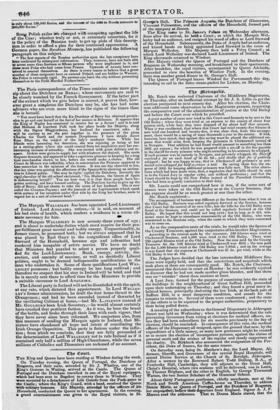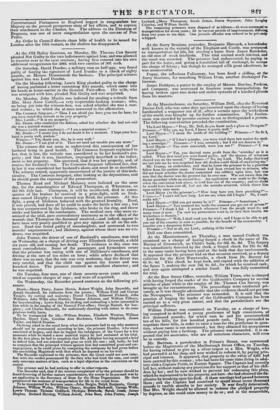Ube liftetropotit.
man addressed some observation to the Magistrates present, respecting the comparative cost of the administration of justice at the Old Bailey
on Thursday, after an ineffectual attempt by Sir J. S. Lillie to get the election postponed to next county day. After his election, the Chair-
and before the Court over which he presided. Mr. Rotch was reelected Chairman of the Middlesex Magistrates,
A great number of cases now tried in this Court used formerly to be sent to the Old Bailey; where they were tried at an expense to the county of about four guineas each, while here they were disposed of for about halt that amount. When it was recollected, that where this Court had tried twenty-five felonies it now tried one hundred and twenty-five, it was clear that, from this arrange- ment, there would be a saving of some thousands a year to the county. It had, however, been stated, that against this saving must be placed the additional ex- pense that would arise from keeping the prisoners in Clerkenwell instead of in Newgate. That addition he had found would amount to something less than 3001. per annum ; for which he was prepared with a set-off in the fees payable to the sheriff for every prisoner who might according to his sentence be whipped. If such prisoner was in custody in Newgate, and privately whipped, the Sheriff received a fee on each head of 31. 6s. 8d., and double that fee if publicly whipped; but he was happy to say, that in Clerkenwell all prisoners so sen- tenced were whipped for half-a-crown a tail. By saving these fees, the ex- pense of 3001. for keeping additional prisoners was fully met. The other altera- tions which had been made were, first, a regulation that the bills should be sent in to the Grand Jury in regular order, and without preference ; and that the Court should be kept by the New Police instead of the Parochial Constables, who had been so grossly inattentive to their duty. Mr. Laurie could not comprehend how it was, if the same sort of causes were taken at the Old Bailey as at the County Sessions, that the expense should be so much greater at one than the other. Mr. Rotch explained—
The arrangement of business was different at the Session from what it was at the Old Bailey. Business was called regularly forward at the Session, because that Court had the control of its own bills; but the bills for the Old Bailey were
found at the Sessions, and could not be called regularly forward at the Old Bailey. He hoped that this would not long exist; but as long as it did, wit-
nesses must be kept in attendance unnecessarily at the Old Bailey, who were summoned to the Sessions only, when the cause in which they were concerned was to come on.
As to the comparative costs of the trials, he would take the figures of the County Treasurer, against the conjectures of his brother Magistrates.
According to the returns made by the treasurer, 189 felonies were tried at Clerkenwell Sessions, and 1,500 were tried at the Old Bailey. There were 2'26 capital felonies tried at the Old Bailey. Now the sum paid by the County Treasurer for the 189 felonies tried at Clerkenwell was 455/. ; the sum paid for the 1,500 felonies tried at the Old Bailey was 7,9841. ; and on the average it was found that the expense at Clerkenwell was 2/. 5s. per trial, while at the Old Bailey it was 41. 10s.
The Judges have decided that the late intermediate Middlesex Ses- sions were legally held, and that the convictions and acquittals which took place at them are consequently good. Mr. Rotch,-the Chairman, announced this decision in court on Monday: he was evidently, rejoiced
to discover that he had not made another gross blunder, and that there
was no "mistake" about those sessions at least.
A Leet Jury, formed for the purpose of examining into the state of the buildings in the neighbourhood of Great Saffron Hill, proceeded
upon their undertaking on Thursday; and they found a great many in- 3
habited houses, principally sheltering the low Irish, at the back part of Saffron Hill, in a most dangerous condition, and unsafe for the inmates to remain in. Several of them were condemned ; and the state of the others is to be reported to the proper authorities, preparatory to their being pulled down.
A meeting of the subscribers to the General Dispensary in Aldersgate Street was held on Wednesday; when it was determined that the rule preventing Governors from voting at elections for medical officers, un- less they had been subscribers for six months previously to the day of election, should be rescinded. In consequence of this vote, the medical officers of the Dispensary all resigned, upon the ground that now, by the expenditure of a little money, so many new governors might be created as to secure the election of incompetent persons, against the claims of personal merit and the wishes of the regular and steady supporters of the charity. Dr. Birkbeck also announced the resignation of the Pre- sident, the Duke of Sussex, for the same reason.
On Saturday next, being St. Matthew's day, the Lord Mayor, Al- dermen, Sheriffs, and Governors of the several Royal Hospitals, will attend Divine Service at the Church of St. Botolph, Aldersgate. After a sermon by the Reverend Robert Todd Doffing, B.A., of Pembroke Hall, Cambridge, they will adjourn to the Great Hall, Christ's Hospital, where two orations will be delivered, one in Latin, by Thomas Brigham, and the other in English, by George Townsend Warner, the two Senior Scholars of the Grammar School.
About thirty Portuguese gentlemen. chiefly merchants, met at the North and South American Coffee-house on Thursday, to address 'Donna- Maria, at Queen of Portugal, and the Dutchess of Braganza, her stepniother,:betore their departure from England. Signor A. J. F. Mareco read the addresses. That to Donna Maria stated, that the
Constitutional Portuguese in England begged to congratulate her Majesty on the present prosperous state of her affairs, and to express their attachment to the- Charter, &c. The address to the Dutoheas of Braganza, was one of mere congratulation upon the success of Don Pedro.
An Order in Council directs clean bills of health to be issued for London after the 19th instant, as the cholera has disappeared.

















 Previous page
Previous page